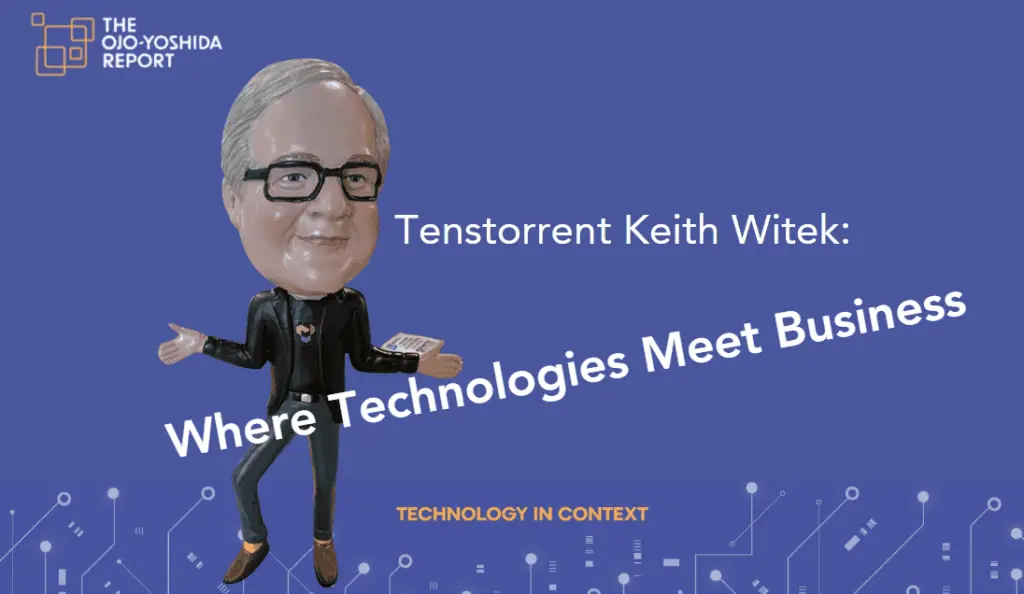
Tensorrent COO Keith Witek chats with Junko and Bola
How could a semiconductor startup working in AI crack a competitive marketplace already lopsidedly locked in by Nvidia Corp., a giant with a $2.2 trillion market cap?
It couldn’t.
Or you couldn’t, as long as you see the market from the giant’s perspective, trying to tap its supply chain, hire the same people and duplicate its innovations. “You’re going to do the same thing, three years late, as what they [the winners of the market] have been already doing,” said Keith Witek, chief operating officer at Tenstorrent.
Our chat with Witek is an eye-opener.
Right or wrong, Witek’s got moxie, technology and a professional background that includes stints at Motorola, AMD, Tesla and Google to back up his observations. Most important, he has Tenstorrent to back up his moxie.
Amiable and articulate, Witek doesn’t mince words about past failures by once-dominant companies like Digital Equipment, Sun Microsystems, IBM, Motorola and Nokia.
“What happens to the big incumbents is that they are handcuffed to their past investments, their financial situation, their staffing, their customer roadmaps,” said Witek. “They can’t pivot, and they can’t change.”
He sees the same principles applying to currently successful companies. Recalling a brainstorming conversation, about adapting to changing times with an Arm executive a decade ago, Witek was told, “Keith, anything [new] we do would create risks, increase our operational expenditures and capital expenditures.”
Witek’s verdict: “They are handcuffed to their business, they’re handcuffed now to their stock price.”
In Nvidia’s case, “They’re handcuffed to their investment in graphics and CUDA.” Witek noted, “That’s not necessarily a bad thing. You make money with what you have.” But if Witek is right, any company’s current money-makers could become pitfalls in the future.
From his vantage point, the key for startups is to identify disruptions, turn them into a competitive benefit before they become a risk and evolve into a liability.
Tenstorrent’s angle is the simple fact that AI is still very new.
Contrary to the media buzz, technologies to do AI compute right aren’t set. Nor are AI business models devised to win customers over. More important, potential customers are asking for a variety of solutions to fit their AI needs.
We are delivering what our customers want, in the way they want to consume them.
Keith Witek
Witek observed that some AI aspirants want early access to Tenstorrent’s IP so they can design their own chips. Others simply want to buy AI chips and SoCs. Some companies are interested in using whole boards from Tenstorrent. Others want to get chiplets from Tenstorrent as jigsaw pieces.
By listening to customers, Tenstorrent delivers “what they want, in the way they want to consume them,” said Witek.
Rather than sticking to just one business model such as IP licensing, or building AI boxes, “We are building up our business from scratch, and we are going to make money on boxes, chips, chiplets and licensing because we feel we can build that better than anybody else out there.”
Tenstorrent’s kitchen-sink stategy remains to be proven. But the company has very high confidence in its technology prowess, with a team led by the legendary chip architect Jim Keller and with the business expertise of veterans such as Witek.
This chutzpah enables Tenstorrent to present itself more audaciously than most previous startups — to a point where national governments like Japan, or system giants like Hyundai and Samsung, have come knocking on Tenstorrent’s door probing for AI solutions.
Our wide-ranging podcast conversation with Witek ranges from technical issues such as heterogeneous computing, RISC-V and chiplets to business concerns, including a growing number of monopoly/duo plays (machineries, tools, foundries, etc.) in the tech industry.
Corporations say they need “open innovation” and “choices.” In reality, technology industries, particularly in the AI field, are dependent on, or beholden to, an ecosystem tightly controlled by a handful of players. The natives, in short, are getting restless.
The prevailing trend of monopoly and duo plays is causing “a psychological change in their mind, not even at the company level, but also the national government’s level,” concluded Witek.
Junko Yoshida is the editor in chief of The Ojo-Yoshida Report. She can be reached at junko@ojoyoshidareport.com
Copyright permission/reprint service of a full Ojo-Yoshida Report story is available for promotional use on your website, marketing materials and social media promotions. Please send us an email at talktous@ojoyoshidareport.com for details.
